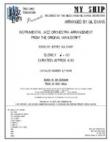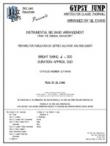SPANISH DANCE (NO. 5)
Recorded by the Claude Thornhill Orchestsra
Arranged by Gil Evans, Edited by Jeffrey Sultanof

Cat #: JLP-8456
$85.00This item usually ships within 1 business day.
Questions?
Please call +1-518-587-1102 or email us.
Edition: Jazz Big Band Arrangement
Description: Advanced
Publisher: Jazz Lines Publications
Background:
In many ways, Claude Thornhill led an avant-garde society dance band. Like such leaders as Henry King and Ted Fio Rito, he played piano as his ensemble accompanied him. More often than not, the tempos were slow to medium, and the music styled for dancing. In the early years, the ensemble was known as a ‘sweet’ band that sometimes played more ambitious music. Even Gil Evans’ settings of There’s a Small Hotel and I Don’t Know Why (I Just Do) could have been played by King or Fio Rito.
When Thornhill re-formed his orchestra after serving in the Navy, Evans rejoined and became musical director. The band continued the format that had made it successful before the war, but Evans had grown musically, and his scores were more challenging. Within the framework of piano/leader accompanied by orchestra, Evans created some of his most impressive work. Some of his scores incorporated bebop, improvised solos from the instrumentalists in the band and harsh dissonances; some were ambitious such as Spanish Dance. Eventually Thornhill became disenchanted with Evans’ experiments, and by 1948, Evans left.
The Music:
There were a number of adaptations of classical pieces in the band’s book; Arab Dance from The Nutcracker Suite was written in 1941 but recorded in 1946, and The Old Castle from Pictures at an Exhibition was recorded for radio transcription. Pieces by Schumann, Grieg and Brahms were also arranged for the band. This adaptation of the fifth dance (Andaluza) from Enrique Granados’ 12 Dances Espanolas was probably written sometime in 1947 and was recorded for radio transcriptions in 1949. Very often recordings for radio were shorter than commercial recordings, and arrangements were routinely cut. The sole recording of Spanish Dance was not only cut but the score altered as well. This publication presents Evans’ original version.
2 Alto Saxophones (both double Clarinet)
2 Tenor Saxophones (1 doubles Clarinet; 2 doubles Bass Clarinet)
Baritone Saxophone (doubles Bass Clarinet)
4 Trumpets (4th is an alt part for horn 1)
2 Horns in F (alt parts included)
3 Trombones (3rd is an alt part for horn 2)
Tuba
Guitar
Piano
Bass
Drums







